Law firms handling sensitive client data like protected health information (PHI) must comply with HIPAA regulations. Non-compliance can lead to hefty fines, damaged client relationships, and reputational harm. To meet HIPAA requirements, law firms need secure cloud storage solutions that encrypt data, control access, and enable staff training.
Here are the 7 best HIPAA-compliant cloud storage providers for law firms:
- Microsoft OneDrive: Integrates with Microsoft 365, offers encryption, two-factor authentication, custom domains, and scalable storage.
- Amazon AWS: Provides secure storage options like Amazon S3 and Amazon EFS, scalability, flexibility, encryption, access controls, and audit logs.
- Dropbox Business: Offers file sharing, backup, SSL encryption, access controls, two-factor authentication, and single sign-on.
- Google Drive: Works with Google apps, provides affordable storage, file sharing, backup, encryption, access controls, and two-factor authentication.
- Box: Offers unlimited storage, app integrations, end-to-end encryption, custom permissions, access controls, and audit trails.
- Sync.com: Provides encryption, sharing options, file versioning, custom branding, zero-knowledge encryption, access controls, and audit trails.
- IDrive: Offers online backup, cloud storage, multi-device backup, versioning, encryption, access controls, and audit trails.
| Provider | Key Features | HIPAA Compliance | Entry-Level Pricing |
|---|---|---|---|
| Microsoft OneDrive | File sharing, collaboration, encryption, access controls | BAA, encryption, access controls, audit logs | $6.99/user/month |
| Amazon AWS | Secure storage, scalability, flexibility | Encryption, access controls, audit logs | $0.023/GB-month |
| Dropbox Business | File sharing, backup, SSL encryption | Access controls, two-factor authentication, SSO | $15/user/month |
| Google Drive | File sharing, collaboration, encryption, access controls | BAA, encryption, access controls, two-factor authentication | $6/user/month |
| Box | Unlimited storage, app integrations, end-to-end encryption | BAA, encryption, access controls, audit trails | $15/user/month |
| Sync.com | Encryption, sharing, versioning, custom branding | Zero-knowledge encryption, BAA, access controls, audit trails | $8/user/month |
| IDrive | Online backup, cloud storage, multi-device backup | Encryption, access controls, audit trails | $99.50/year |
When choosing a HIPAA-compliant cloud storage provider, consider security and compliance, data storage and retrieval, collaboration and sharing, and pricing and scalability.
Related video from YouTube
1. Microsoft OneDrive
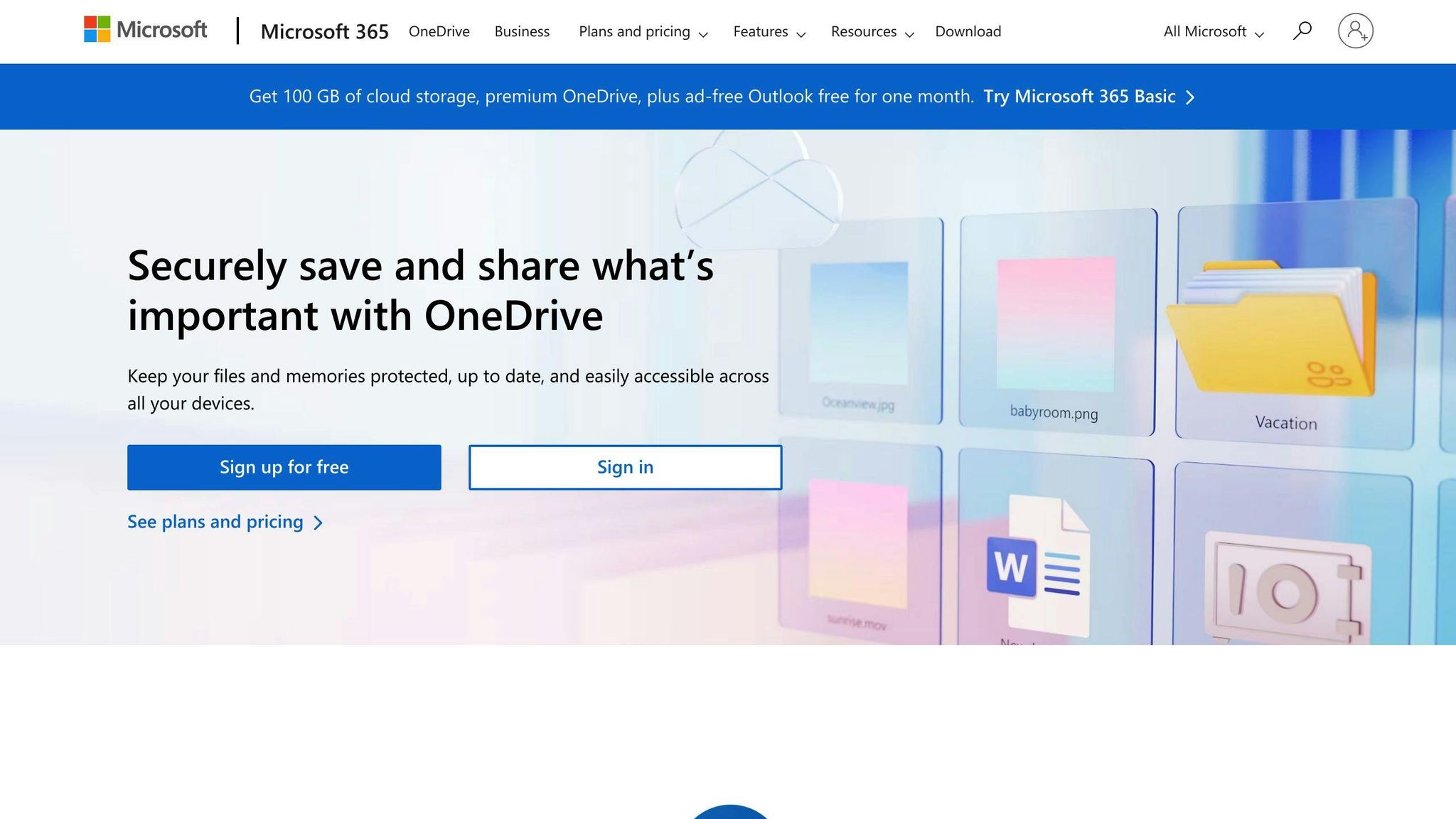
About OneDrive
OneDrive is Microsoft's cloud storage service. It allows law firms to store and manage client data securely, including protected health information (PHI). OneDrive meets HIPAA compliance requirements, making it a trusted option for handling sensitive data.
Key Features
OneDrive offers several useful features for law firms:
- Microsoft 365 Integration: Seamless collaboration and document management within the Microsoft ecosystem.
- Security: Encryption, two-factor authentication, and other measures to protect data.
- Custom Domains: Law firms can use their own domain names.
- Scalable Storage: Increase storage capacity as needed.
HIPAA Compliance
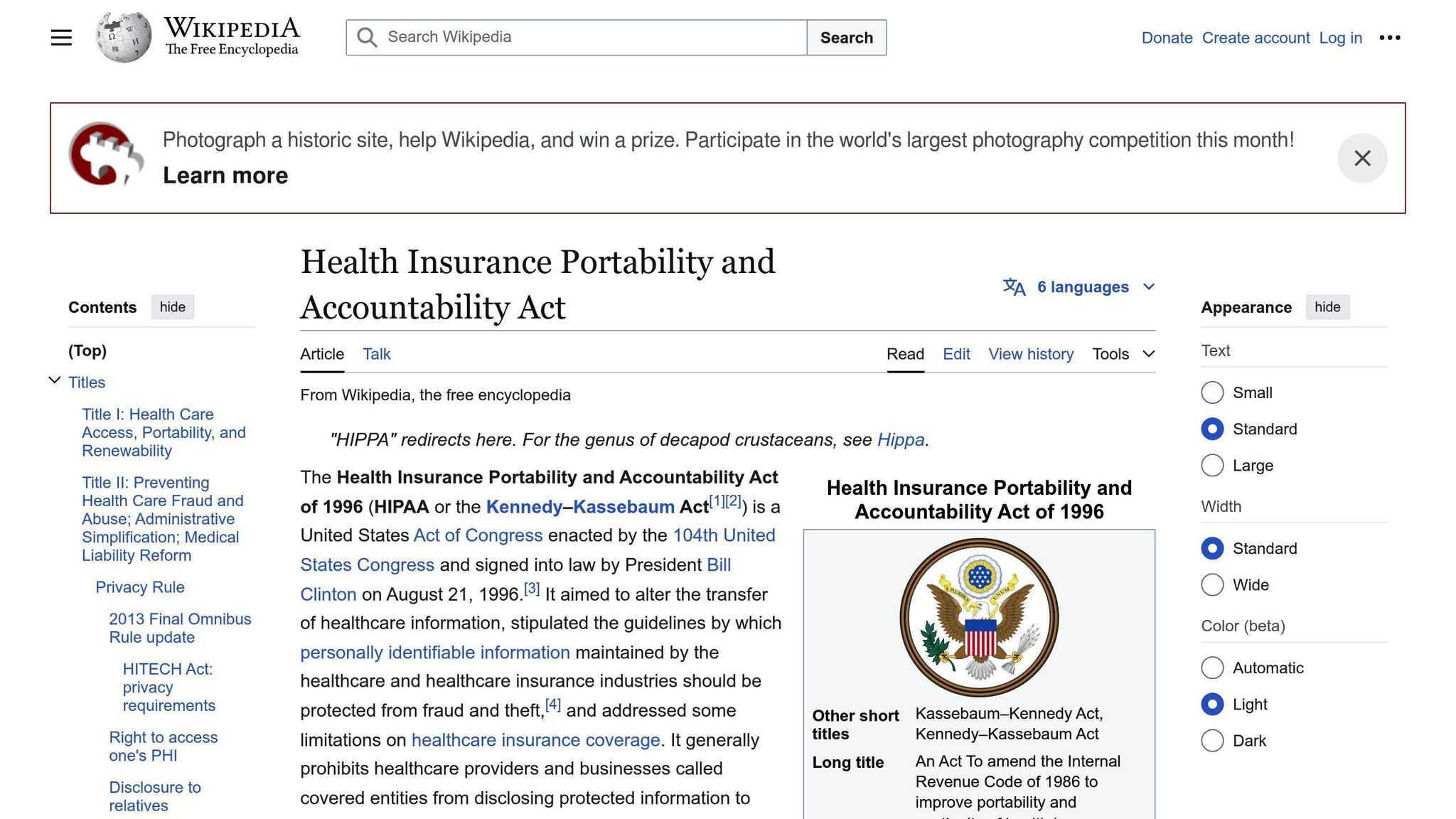
Microsoft provides a Business Associate Agreement (BAA) outlining responsibilities for protecting PHI. OneDrive includes:
- Encryption for data in transit and at rest
- Access controls and authentication
- Audit logs and reporting
Pricing Plans
| Plan | Storage | Price |
|---|---|---|
| Personal | 1 TB | $6.99/user/month |
| Business | 1 TB | $8.25/user/month |
| Enterprise | Custom | Custom |
Pros and Cons
| Pros | Cons |
|---|---|
| Microsoft 365 integration | Limited customization |
| Strong security features | Learning curve for non-Microsoft users |
| Scalable storage | Limited support for non-Windows devices |
| Custom domain support |
2. Amazon AWS

About Amazon AWS
Amazon Web Services (AWS) is a cloud computing platform from Amazon. It offers storage, computing, databases, analytics, and more. Law firms choose AWS for its scalability, flexibility, and strong security.
Key Features
AWS provides key features for law firms:
- Secure Storage: Options like Amazon S3, Amazon EBS, and Amazon Elastic File System (EFS) to store sensitive data securely.
- Scalability: Law firms can increase or decrease storage and computing resources as needed.
- Flexibility: AWS can be customized to meet specific needs, supporting various operating systems, programming languages, and applications.
HIPAA Compliance
AWS is HIPAA-compliant and offers features to support compliance:
- Encryption: Data is encrypted in transit and at rest, protecting it from unauthorized access.
- Access Controls: Identity and access management (IAM) controls who can access sensitive data.
- Audit Logs: Detailed logs track access and activity for monitoring and reporting compliance.
Pricing Plans
AWS uses a pay-as-you-go model, so law firms only pay for the resources they use. Pricing varies based on the specific services and resources used.
| Service | Pricing |
|---|---|
| Amazon S3 | $0.023 per GB-month (standard storage) |
| Amazon EBS | $0.05 per GB-month (general-purpose SSD) |
| AWS Lambda | $0.000004 per request |
Pros and Cons
| Pros | Cons |
|---|---|
| Scalable and flexible | Steep learning curve for non-technical users |
| Strong security features | Can be complex to manage and optimize |
| Wide range of services and resources | Pricing can be unpredictable and variable |
| Supports various operating systems and applications |
3. Dropbox Business
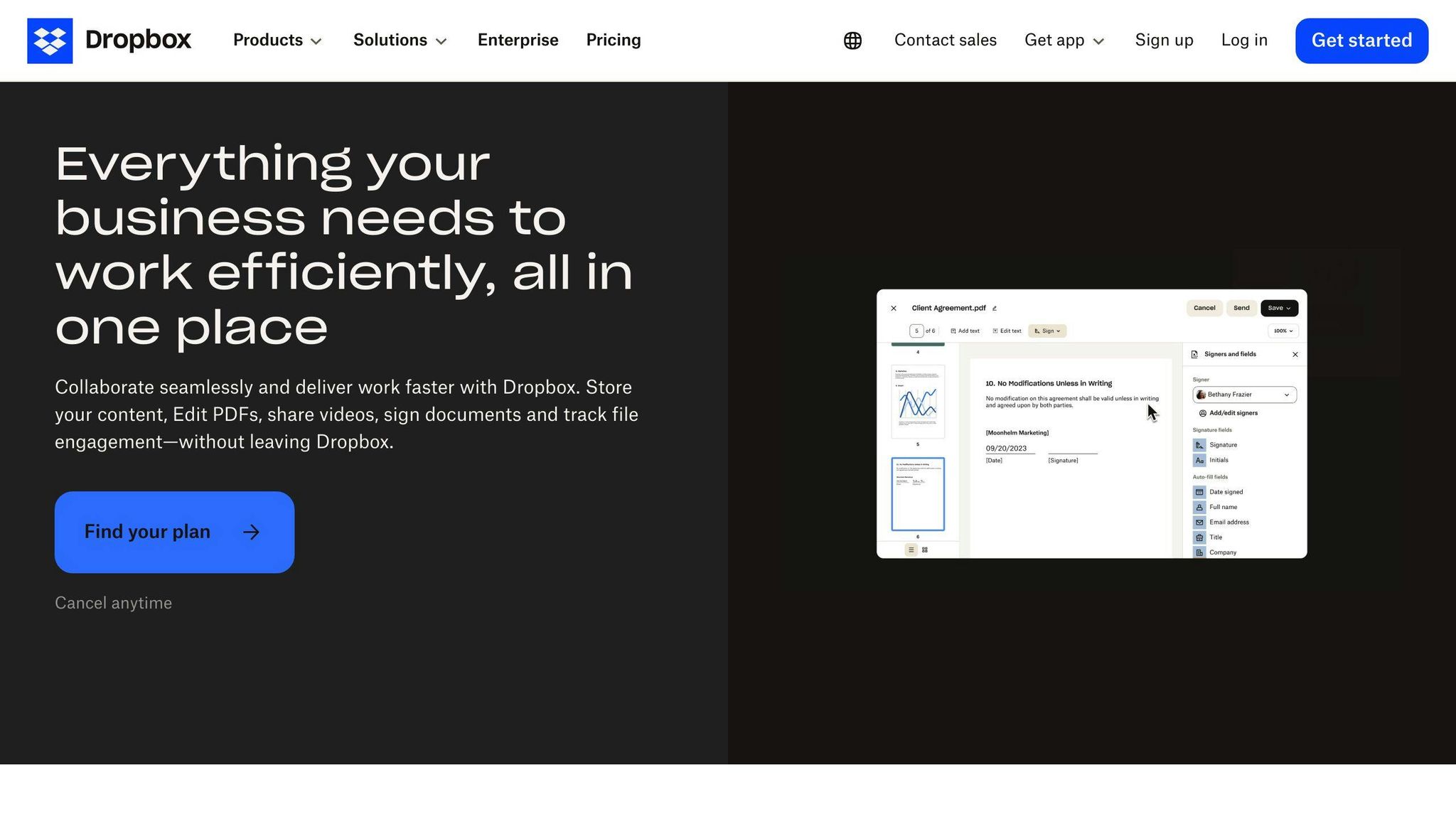
About Dropbox Business
Dropbox Business is a cloud storage service designed for teams and businesses, including law firms. It provides a secure way to store, share, and manage files, including sensitive client data.
Key Features
Dropbox Business offers several useful features for law firms:
- File Sharing and Collaboration: Users can easily share files and folders with others, both within and outside the firm.
- Backup and File History: Dropbox Business keeps track of past file versions and provides backup capabilities.
- Security: All accounts are protected with SSL encryption to keep data safe, regardless of the platform used.
HIPAA Compliance
Dropbox Business is HIPAA-compliant and includes features to support compliance:
- Access Controls: Law firms can configure sharing permissions to control who can access sensitive data.
- Two-Factor Authentication: An extra layer of security is provided through two-factor authentication.
- Single Sign-On (SSO): SSO simplifies user authentication and access management.
Pricing Plans
| Plan | Storage | Price |
|---|---|---|
| Standard | 5 TB | $15/user/month |
| Advanced | Unlimited | $25/user/month |
| Enterprise | Unlimited | Custom pricing |
Pros and Cons
| Pros | Cons |
|---|---|
| Easy file sharing and collaboration | Expensive compared to some alternatives |
| Strong security features | Finding specific folders can be confusing |
| Scalable storage options |
Note: Pricing is subject to change. Check the Dropbox Business website for the latest information.
4. Google Drive
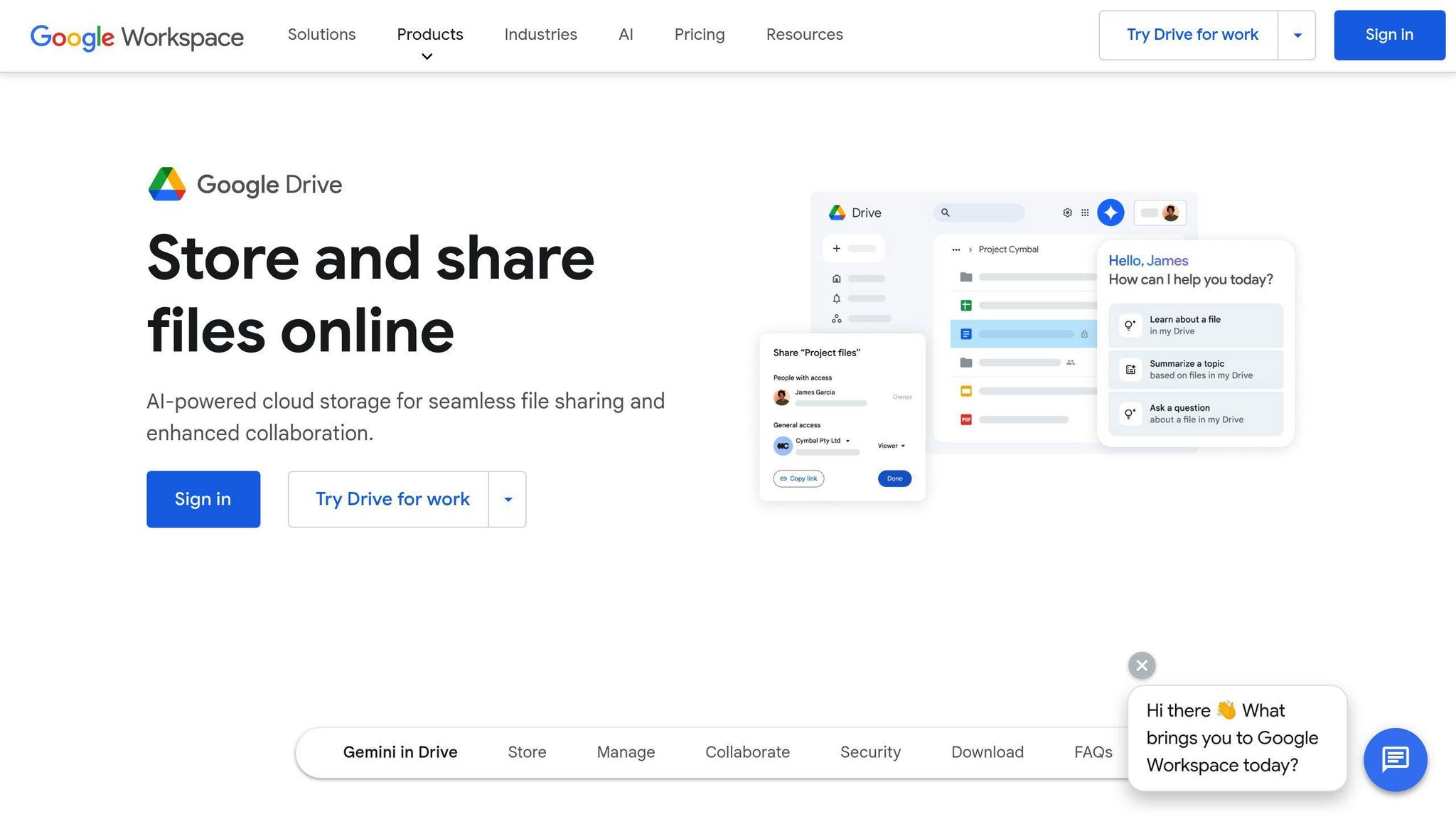
About Google Drive
Google Drive is a cloud storage service from Google. It allows users to store, share, and access files from anywhere. This makes it a good choice for law firms. With Google Drive, law firms can keep all their files in one place, work together with team members, and follow HIPAA rules for data security.
Key Features
Google Drive offers several useful features for law firms:
- Works with other Google apps: Google Drive works well with other Google apps like Google Docs, Sheets, and Slides. This makes it easy to collaborate and share files.
- Affordable storage options: Google Drive offers low-cost pricing plans for law firms of all sizes.
- File sharing and collaboration: Users can easily share files and folders with others, both inside and outside the firm.
- Backup and file history: Google Drive keeps track of past file versions and provides backup capabilities.
HIPAA Compliance
Google Drive follows HIPAA rules and includes features to support compliance:
- Business Associate Agreement (BAA): Google signs a BAA with covered entities, ensuring they follow HIPAA regulations.
- Data encryption: Google Drive encrypts data both in transit and at rest, keeping sensitive information protected.
- Access controls: Law firms can control who can access sensitive data by setting sharing permissions.
- Two-Factor Authentication: An extra layer of security is provided through two-factor authentication.
Pricing Plans
| Plan | Storage | Price |
|---|---|---|
| Basic | 30 GB | $6/user/month |
| Business | 1 TB | $12/user/month |
| Enterprise | Unlimited | Custom pricing |
Pros and Cons
| Pros | Cons |
|---|---|
| Easy file sharing and collaboration | Limited customization options |
| Strong security features | Can be expensive for large storage needs |
| Scalable storage options | Integration with non-Google apps can be limited |
Note: Pricing is subject to change. Check the Google Drive website for the latest information.
sbb-itb-d1a6c90
5. Box
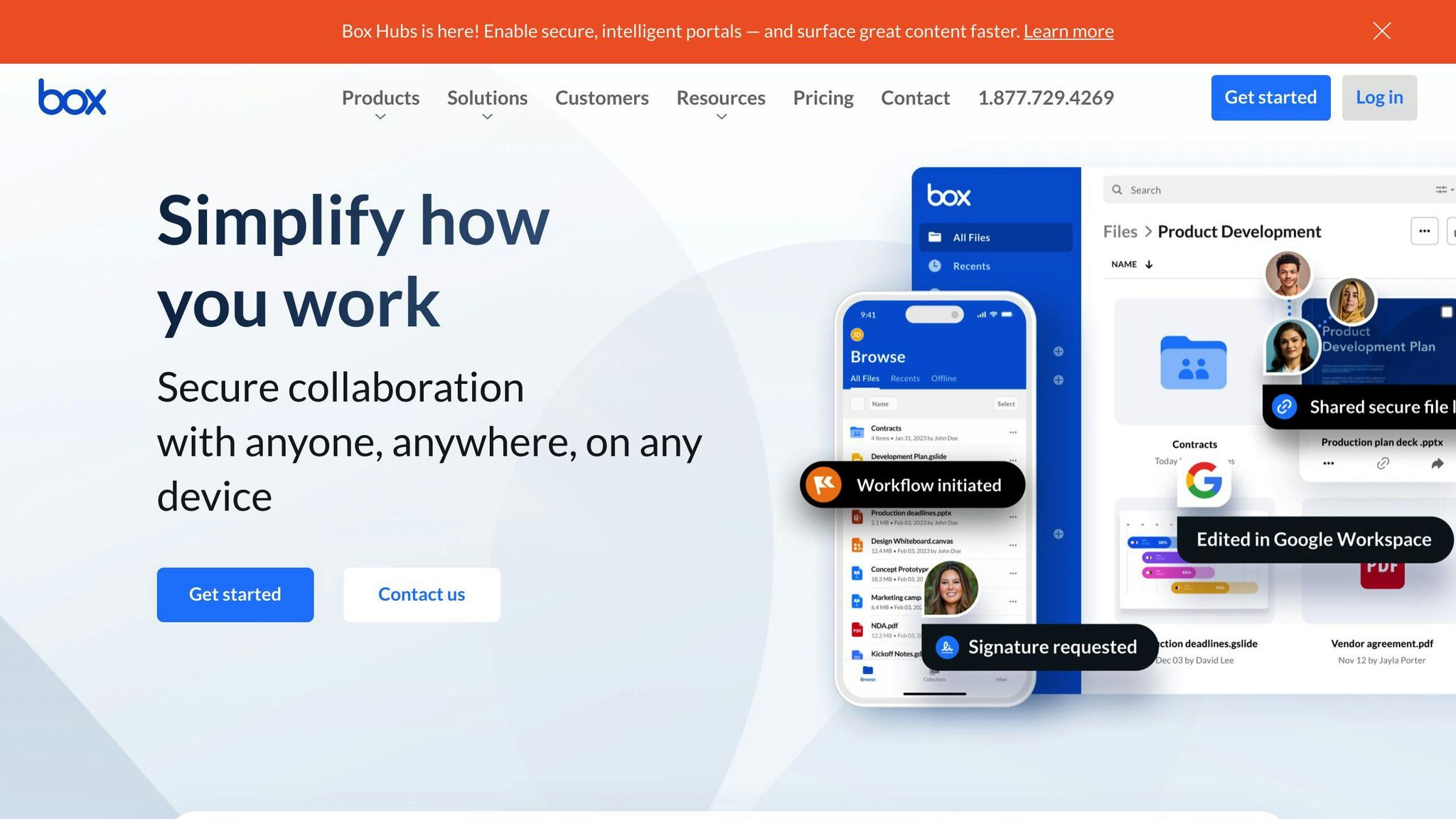
About Box
Box is a cloud storage service that helps law firms store, share, and access files securely. It is a popular choice due to its strong security features and ease of use.
Key Features
Box offers several useful features for law firms:
- Unlimited storage: Store all your files and data in one place.
- App integrations: Works with Microsoft Office, Google Workspace, and other apps.
- End-to-end encryption: Files are protected both in transit and at rest.
- Custom permissions: Control who can access sensitive data.
HIPAA Compliance
Box follows HIPAA rules and includes features to support compliance:
- Business Associate Agreement (BAA): Box signs a BAA with covered entities to ensure HIPAA compliance.
- Data encryption: Data is encrypted in transit and at rest, protecting sensitive information.
- Access controls: Set permissions to control who can access sensitive data.
- Audit trails: Track user activity and ensure accountability.
Pricing Plans
| Plan | Storage | Price |
|---|---|---|
| Individual | 100 GB | $15/user/month |
| Business | Unlimited | $25/user/month |
| Enterprise | Unlimited | Custom pricing |
Pros and Cons
| Pros | Cons |
|---|---|
| Scalable storage options | Can be expensive for large teams |
| Strong security features | Limited customization options |
| Integrates with many apps | Learning curve for new users |
Note: Pricing is subject to change. Check the Box website for the latest information.
6. Sync.com
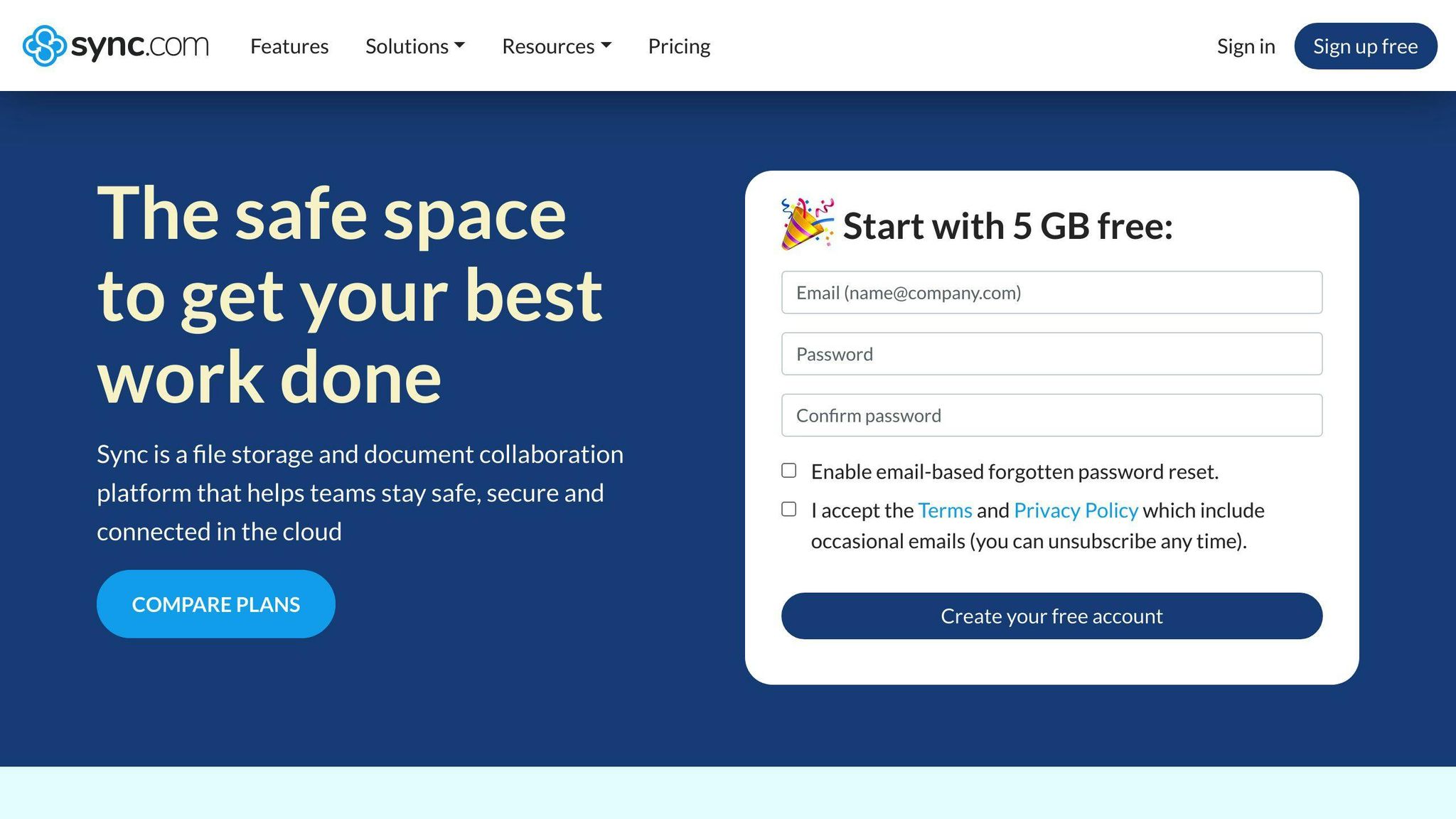
About Sync.com
Sync.com is a cloud storage service that offers a secure way for law firms to store, share, and access files. With its user-friendly interface, Sync.com is a great choice for legal professionals who need to manage sensitive data.
Key Features
Sync.com provides several key features for law firms:
- Encryption: Files are protected with AES-256 encryption, keeping data secure in transit and at rest.
- Sharing options: Users can share files and folders with customizable permissions, controlling access.
- File versioning: Sync.com keeps a record of all file versions, allowing users to revert to previous versions if needed.
- Custom branding: Law firms can customize the Sync.com interface with their own branding.
HIPAA Compliance
Sync.com is HIPAA compliant, offering features to help law firms meet compliance obligations:
- Zero-knowledge encryption: Sync.com does not store encryption keys, ensuring only authorized users can access sensitive data.
- Business Associate Agreement (BAA): Sync.com signs a BAA with covered entities, ensuring HIPAA compliance.
- Access controls: Users can set permissions to control who can access sensitive data.
- Audit trails: Sync.com provides detailed audit trails, enabling law firms to track user activity.
Pricing Plans
| Plan | Storage | Price |
|---|---|---|
| Individual | 5 GB | $8/user/month |
| Business Pro | 1 TB | $15/user/month |
| Business Solo | 4 TB | $25/user/month |
| Enterprise | Unlimited | Custom pricing |
Pros and Cons
| Pros | Cons |
|---|---|
| Secure and reliable | Limited customization options |
| User-friendly interface | Pricing can be steep for larger firms |
| Advanced sharing options | Limited integrations with third-party apps |
7. IDrive
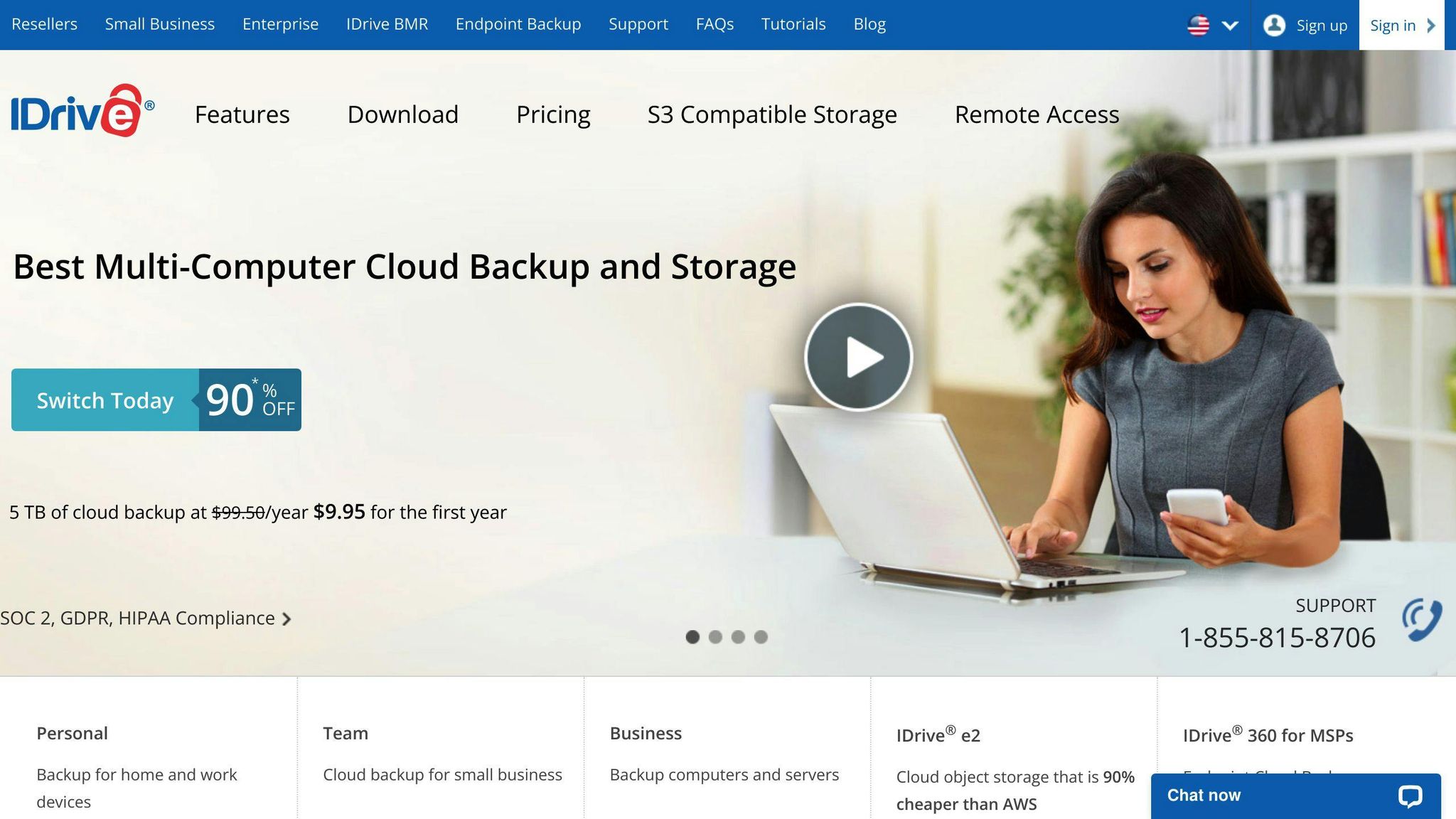
About IDrive
IDrive is a cloud storage service that provides a secure way for law firms to store, share, and access files. Its user-friendly interface makes it a suitable choice for legal professionals handling sensitive data.
Key Features
IDrive offers several key features for law firms:
- Online Backup: Automatic online backup to safeguard data from unexpected losses.
- Cloud Storage: Secure cloud storage with zero-knowledge encryption, ensuring only authorized users can access sensitive data.
- Multi-Device Backup: Backup multiple devices, including computers, laptops, and mobile devices, to a single account.
- Versioning: Access previous file versions if needed.
HIPAA Compliance
IDrive is HIPAA compliant, with features to help law firms meet compliance obligations:
- Encryption: 256-bit AES encryption protects data in transit and at rest.
- Access Controls: Customizable access controls to set permissions and restrict access to sensitive data.
- Audit Trails: Detailed audit trails to track user activity and ensure accountability.
Pricing Plans
| Plan | Storage | Price |
|---|---|---|
| Personal | 5 TB | $99.50/year |
| Team | 25 TB | $499.50/year |
| Enterprise | Custom | Custom pricing |
Pros and Cons
| Pros | Cons |
|---|---|
| Secure and reliable | Limited customization options |
| User-friendly interface | Pricing can be higher for larger firms |
| Advanced sharing options | Limited integrations with third-party apps |
Provider Comparison
Here's a comparison of the 7 best HIPAA-compliant cloud storage providers for law firms:
| Provider Name | Key Features | HIPAA Compliance | Pricing (Entry-level Plan) | Advantages | Drawbacks |
|---|---|---|---|---|---|
| Microsoft OneDrive | Online backup, file sharing, collaboration | 256-bit encryption, access controls, audit logs | $5/user/month | User-friendly, sharing options | Limited customization |
| Amazon AWS | Cloud storage, data analytics, machine learning | 256-bit encryption, access controls, audit logs | $0.023/GB-month | Highly scalable, secure | Complex for non-technical users |
| Dropbox Business | Cloud storage, file sharing, collaboration | 256-bit encryption, access controls, audit logs | $15/user/month | Easy collaboration, user-friendly | Expensive for some firms |
| Google Drive | Cloud storage, file sharing, collaboration | 256-bit encryption, access controls, audit logs | $6/user/month | User-friendly, collaboration tools | Limited customization |
| Box | Cloud storage, file sharing, collaboration | 256-bit encryption, access controls, audit logs | $15/user/month | Strong security, customizable | Limited free storage |
| Sync.com | Cloud storage, file sharing, collaboration | Zero-knowledge encryption, access controls, audit logs | $5/user/month | Advanced security, user-friendly | Customization limitations |
| IDrive | Cloud storage, online backup, file sharing | 256-bit encryption, access controls, audit logs | $99.50/year (5 TB) | Security features, affordable | Customization limitations |
This table compares key features, HIPAA compliance details, pricing, advantages, and drawbacks of each provider. Law firms can use this information to choose a HIPAA-compliant cloud storage solution that fits their needs.
Choosing the Right HIPAA-Compliant Cloud Storage
Selecting the right HIPAA-compliant cloud storage provider for your law firm is crucial. With many options available, it can be confusing to choose the best fit. However, by considering these key factors, you can make an informed decision that meets your firm's needs:
Security and Compliance
Look for providers with robust security measures, such as:
- 256-bit encryption
- Access controls
- Audit logs
Ensure the provider is willing to sign a Business Associate Agreement (BAA) and has undergone independent audits to verify HIPAA compliance.
Data Storage and Retrieval
Consider:
- The amount of storage space you need
- The ease of data retrieval
Look for providers with flexible storage plans and user-friendly interfaces for uploading and accessing files.
Collaboration and Sharing
If you need to collaborate with colleagues or clients, look for providers with robust sharing and collaboration features, such as:
- Real-time commenting
- Version control
Pricing and Scalability
Evaluate the pricing plans of each provider and consider the scalability of their services. Look for providers with flexible pricing plans that can grow with your firm's needs.
| Key Factors | What to Look For |
|---|---|
| Security and Compliance | 256-bit encryption, access controls, audit logs, BAA, independent audits |
| Data Storage and Retrieval | Sufficient storage space, easy data retrieval, user-friendly interface |
| Collaboration and Sharing | Real-time commenting, version control, sharing capabilities |
| Pricing and Scalability | Flexible pricing plans, scalable services to meet growing needs |
FAQs
Which cloud storage services follow HIPAA rules?
Several cloud storage providers offer services that comply with HIPAA regulations. Some top options include:
- Microsoft OneDrive
- Amazon AWS
- Dropbox Business
- Google Drive
- Box
- Sync.com
- IDrive
When choosing a HIPAA-compliant cloud storage provider, look for robust security measures like 256-bit encryption, access controls, and audit logs. Verify that the provider is willing to sign a Business Associate Agreement (BAA) and has undergone independent audits to confirm HIPAA compliance.
How do I ensure my cloud storage follows HIPAA rules?
To ensure your cloud storage follows HIPAA regulations, take these steps:
- Choose a HIPAA-compliant cloud storage provider.
- Sign a Business Associate Agreement (BAA) with the provider.
- Implement strong security measures, such as 256-bit encryption and access controls.
- Conduct regular audits and risk assessments.
- Train employees on HIPAA regulations and best practices.
- Ensure data is properly backed up and recoverable in case of a disaster.
What are the benefits of using HIPAA-compliant cloud storage?
Using HIPAA-compliant cloud storage offers several benefits:
- Enhanced data security and protection: Safeguards sensitive information from unauthorized access or breaches.
- Compliance with HIPAA regulations: Avoids potential fines and penalties for non-compliance.
- Scalability and flexibility: Easily adjust storage capacity as your data needs grow.
- Cost-effective storage solutions: Eliminates the need for expensive on-premises hardware and maintenance.
- Improved collaboration and sharing capabilities: Securely share and access files with colleagues or clients.
- Reduced risk of data breaches and penalties: Mitigates the risks associated with data mishandling or loss.


